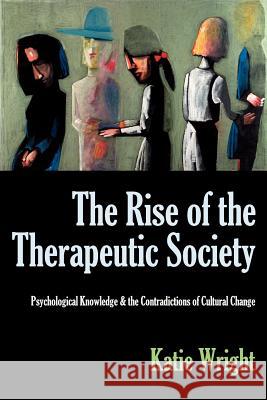The Rise of the Therapeutic Society: Psychological Knowledge & the Contradictions of Cultural Change » książka
The Rise of the Therapeutic Society: Psychological Knowledge & the Contradictions of Cultural Change
ISBN-13: 9780983245124 / Angielski / Miękka / 2011 / 290 str.
The Rise of the Therapeutic Society: Psychological Knowledge & the Contradictions of Cultural Change
ISBN-13: 9780983245124 / Angielski / Miękka / 2011 / 290 str.
(netto: 105,41 VAT: 5%)
Najniższa cena z 30 dni: 110,38
ok. 16-18 dni roboczych
Dostawa w 2026 r.
Darmowa dostawa!
Taking Australia as the focal point, Wright traces the ascendancy of therapeutic culture from 19th-century concerns about nervousness to the growth of psychology, the diffusion of an analytic attitude, and the spread of therapy and counseling. She argues convincingly for a reappraisal of therapeutic culture.
This book is an examination of the contemporary fascination with psychological life and the historical developments that fostered it. Taking Australia as the focal point, Katie Wright traces the ascendancy of therapeutic culture, from nineteenth century concerns about nervousness, to the growth of psychology, the diffusion of an analytic attitude, and the spread of therapy and counseling. Wrights analysis, which draws on social theory, cultural history, and interviews with therapists and people in therapy, calls into question the pessimism that pervades many accounts of the therapeutic turn and provides an alternative assessment of its ramifications for social, political, and personal life in the globalized West."Wrights work provides an all important antidote to a long series of off-base polemics that misunderstand the role of psychotherapy in contemporary society. Wrights work provides a sharp and welcome contrast. She finds the language of therapy at the heart of the new social movements." -Jeffrey C. Alexander, Lillian Chavenson Saden Professor of Sociology, Yale University"The strength of Wrights work lies in its emphasis on the complex, contradictory ways in which various aspects of our global worlds enter into the inner, emotional texture of identity as well as the processes through which the unconscious imagination constitutes fabrications of the social-historical world." -Anthony Elliott, Chair of Sociology, Flinders University, Australia."This work makes an important contribution to cultural and historical sociology. Wright argues convincingly for a reappraisal of therapeutic culture through a compelling critique of existing theory and by drawing on alternative traditions to those that have dominated scholarship in this field. The case studies she presents are intrinsically interesting and theoretically important, and her innovative perspective on the therapeutic society will make a valuable and significant contribution to the field." -Zlatko Skrbis, Dean, UQ Graduate School, The University of Queensland, Australia.











